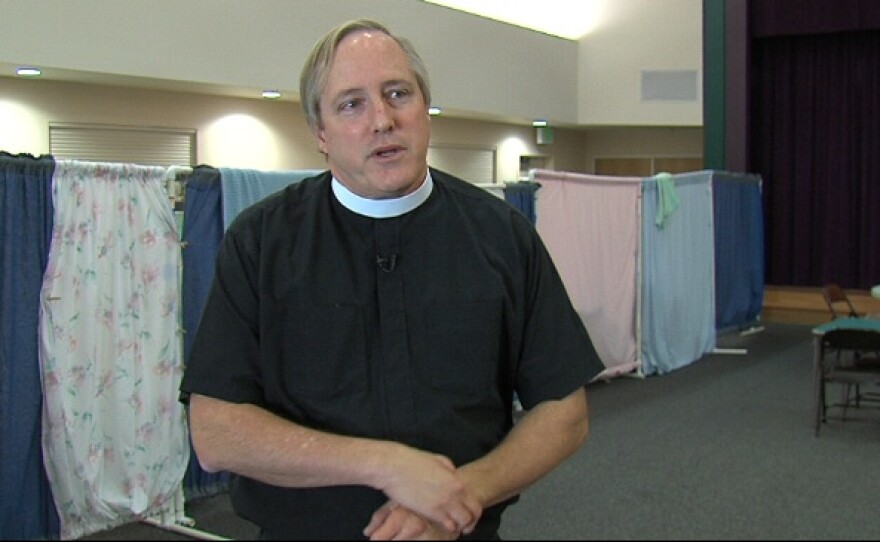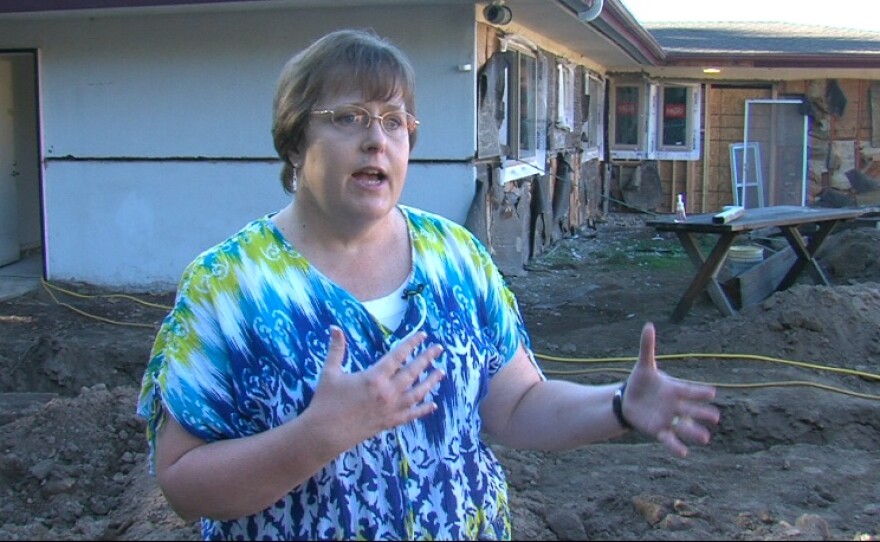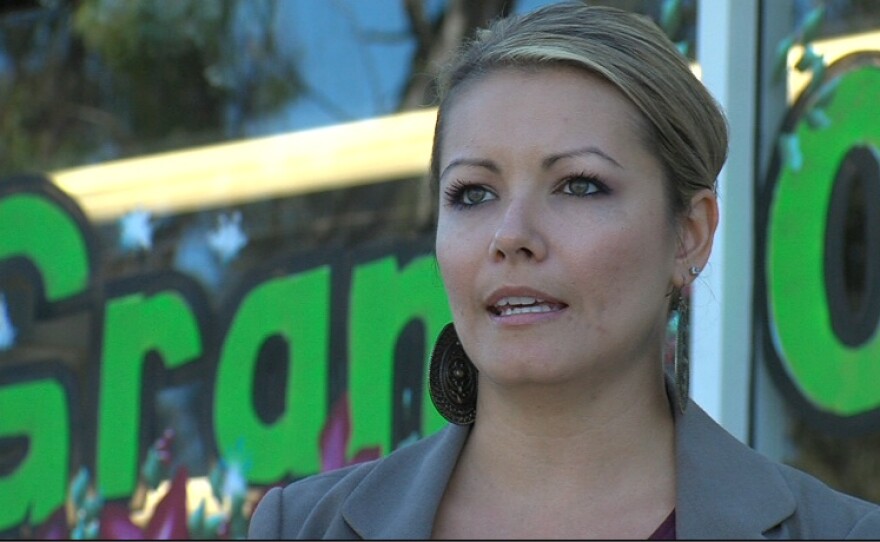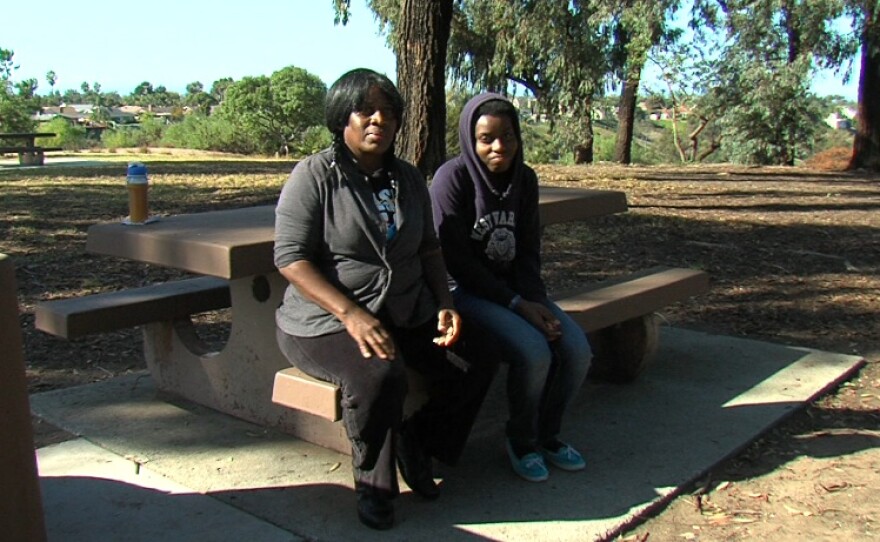The Regional Task Force on the Homeless estimated at last count that about 1,700 people are homeless in North County and fewer than half of them are in shelters. In the winter months, a regional network of organizations and cities pulls together to find ways to bring them in out of the cold.
Sandra Samuels sits at a picnic table in a public park in Oceanside next to her 17 year old daughter Andrea. Their lives unraveled after Sandra separated from her ex, lost her job and about a year ago, found herself without a home.
“I never thought that I’d be in this situation,” she said, “ but here I am and the economy now is really bad.“
The Samuels are staying in a temporary shelter in a nearby church hall, but they have to leave during the day and often find themselves in public parks or libraries.
“If it was just me,” Sandra said, “I could handle it a little bit better, but when you have your child with you, you’re wondering, am I being a good mother?”
Andrea keeps her dark hoodie pulled up around her face. She is in her final year at school, but she hasn’t told any of her friends she is staying in a homeless shelter.
“It’s just hard, I don’t really want to talk about it so I keep it to myself,” she said. “It’s just really difficult for me because I’m so used to having my own room and what I used to have, and going out whenever I wanted to with my friends, not having to go back to a place so early, like a curfew. But I have to hang in there with my mom.”
The women can spend two weeks staying in "King of Kings" Lutheran Church in Oceanside, part of the Interfaith Shelter Network. Pastor James Jerpseth said the congregation borrowed cubicle dividers from a neighboring church, and it took them just over an hour to get them all set up.

“We just pop ‘em all together,” he said, “put it up, get everybody settled in. It’s very simple.”
Jerpseth said it wasn’t hard to convince his congregation to take on the winter shelter for a couple of weeks. They provide a warm meal every night and breakfast in the morning.
“If you’re not going to do this,” he told them, “if you’re not going to help people who need help, you’re just a social club with a T on the roof.“
A little further east in Vista, a more permanent shelter for families is going up. Heavy equipment and men with power tools are hard at work, modifying a building that used to house the Vista Community Clinic.
Russell Blackwood, Director of Operation Hope, has run North County’s winter shelter for families for the last few years in a rented warehouse. It was warm and welcoming, but makeshift. Blackwood is jubilant about about how things are going to change this year.
“It’s going to be very comfortable,“ he said, “Our families will have a room with a ceiling and a door as opposed to a cubicle with no ceiling and a curtain, so that will give them a little sense of dignity as they get their lives together. “
He points to an architectural drawing. “This will be the children's playground, this will be walled in right here, so it will be a closed compound with privacy for the women and safety for the children.”
There will also be a laundry and washroom building with showers, and a separate Learning Center with a classroom for meetings and training. Operation Hope bought the property from Vista Community Clinic for $600,000. The organization has received donations from the cities of Vista and Oceanside, plus Vista’s United Methodist Church and some generous individuals.
Beth Brainerd Hallock will help run the shelter when it opens, with 46 beds. Standing on the construction site, she described how she hopes the compound will feel to the homeless families.

“Once you come into the gate and behind the walls,“ she said, “your children are safe, you know they are in a safe compound. And less stress allows you to put your focus on taking classes, doing your resume and looking for a job -- turning your life around so your children can feel safe and secure. If they are wounded when they are young, they’re going to repeat that cycle when they’re older,” she said, “and we need to stop that.”
The only trouble is that this site won’t be ready to open until January. The winter shelter program usually starts December 1st and runs for four months.
That poses a challenge for the network of organizations trying to keep families with a roof over their heads when the weather turns cold.
Jennifer Conte of Community Resource Center in Encinitas said even in that relatively affluent community, they get three to five calls a day from people looking for shelter.

“When it gets colder, not only do we get more phone calls, all the other organizations get more phone calls,” Conte said. “ But the resources that we have, we don’t have enough to give those families. Having Operation Hope not open until January is going to be hard on a bunch of families this year. “
Families can apply for motel vouchers to tide them over for up to 28 days. North County Lifeline, another link in the shelter network, has twice as much money as last year for motel vouchers for families -- more than $100,000. But already, almost 90 families have applied for them, compared to fewer than 60 during all of last winter, and demand often outstrips the supply.
Back at the picnic table, Sandra and Andrea Samuels consider a winter of moving from shelter to shelter, trying to keep their spirits up while Sandra looks for a job.
“People don’t want to be homeless," Sandra said. “They don’t want to be out here. I’m speaking for myself, but I spoke with a lot of people that had real good jobs and they've been brought down. So it could happen to anybody.“
Samuels put a protective arm around her daughter’s shoulders.
“Of course you worry,” she said, “but you have to go on and be strong. You try to tell your child that things are going to be alright, your mama’s going to get a job. I’m proud of her because, in spite of us moving around, she’s still keeping up her grades, and she still is going to graduate.”
Andrea smiles from under her hoodie.
Almost 500 people used North County’s winter shelter network last year, and about 40 percent of them were women.








